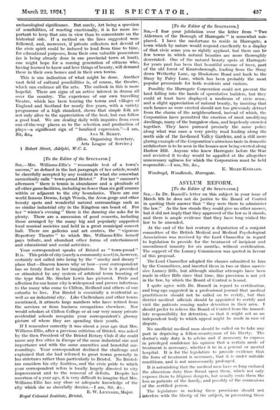[To the Editor of the SPECTATOR.] SIR,—Mrs. Williams-Ellis's " reasonable
test of a town's success," as defined in the last paragraph of her article,would be cheerfully accepted by any resident in what she somewhat sarcastically calls " town-proud Bristol." For her " summer's afternoon " there is tennis in abundance and a plenitude of all other game facilities, including no fewer than six golf courses within or adjacent to the city boundaries. There are our world famous Downs, Leigh Woods, the Avon gorge and other beauty spots and wonderful natural surroundings such as no similar industrial city in the Kingdom can boast of. For her " winter's evening " there is the dancing she asks for in plenty. There are a succession of good concerts, including those arranged by the many big and popularly supported local musical societies and held in a great municipal concert hall. There are galleries and art centres, the " vigorous Repertory Theatre " to which Mrs. Williams-Ellis herself pays tribute, and abundant other forms of entertainment and educational and social activities.
Your correspondent speaks of Bristol as " town-proud " It is. This pride of city (surely a community asset) is, however, certainly not called into being by the " smoky and dreary " place that—Heaven knows why or how—your correspondent has so firmly fixed in her imagination. Nor is it provoked or stimulated by any system of artificial town boosting of the type that Mr. Sinclair Lewis has pictured. Pride and -affection for our home city is widespread and proves infectious to the many who come to Clifton, Redland and others of our suburbs to live. For Bristol is essentially a residential as well as an industrial• city. Like Cheltenham and other towns mentioned, it attracts large numbers who have retired from the services or from business occupations elsewhere. Nor would scholars at Clifton College or at our very many private -residential schools recognize your correspondent's gloomy picture of where they are spending their youth.
If I remember correctly it was about a year ago that Mrs. WilliamS-Ellis, after a previous criticism of Bristol, was asked by the then President of the Bristol Rotary Club if she could name any five cities in Europe of the same industrial size and importance and with the same amenities and beautiful sur- roundings. Your correspondent declined the challenge and explained that she had referred to great towns generally in her strictures rather than particularly to Bristol. No Bristol- ian considers his city faultless, and the civic pride to which your correspondent refers is locally largely directed to city improvement and to the removal of defects. Despite her assertion of a year ago, it is very difficult to imagine that Mrs. Williams-Ellis has any close or adequate knowledge of the city which she so cheerfully decries.—I am, Sir, &c., E. W. LENNARD, Major. Royal Colonial Institute, Bristol.














































 Previous page
Previous page